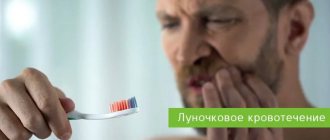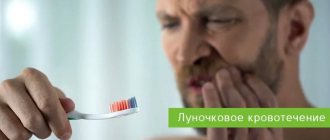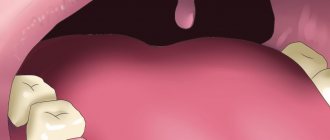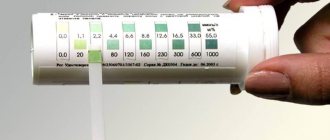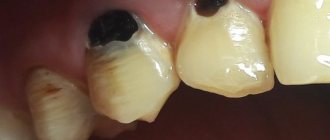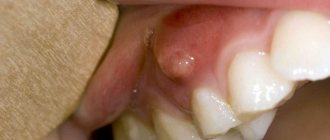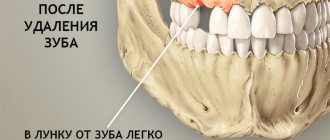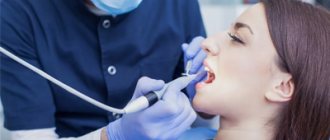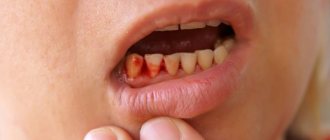Causes of bleeding Classification How to stop?
Dentist's help Prevention Tooth extraction is a surgical procedure that cannot be performed without damaging tissues and blood vessels. This causes bleeding from the tooth socket. The blood forms a clot that protects the wound from bacteria. Usually, it stops coming out of the wound after a few minutes, but there are cases when bleeding continues for several hours or even days.
Why do my gums bleed?
Bleeding from the gums can occur for mechanical or pathological reasons.
The first group includes a blow to the jaw area or minor injuries due to an incorrectly selected crown or filling. In this case, bleeding goes away immediately after the problem is eliminated. Only a doctor can assess whether a crown has been chosen correctly or a filling has been installed during a face-to-face consultation, because it is difficult to see such nuances on your own. Gums can also be damaged by a brush that is too hard, intensive use of dental floss, or careless impact with other objects in an attempt to completely remove food debris. In this case, bleeding appears only after the procedure and disappears after a few minutes.
Pathological causes are associated with diseases of the oral cavity and other organs. Bleeding is a symptom:
- gingivitis - inflammation of the gums;
- stomatitis - ulcers on the oral mucosa;
- periodontitis - inflammation of the soft tissues around the tooth (localized - in several units, or generalized with damage to the entire jaw);
- leukemia (leukemia) - blood cancer with a characteristic decrease in immunity;
- intoxication with heavy metals (lead, mercury);
- diabetes mellitus, which causes weakness of the gums and blood vessels due to characteristic angiopathy.
Often gums bleed due to hormonal changes. It can be caused by pregnancy, menstrual irregularities, and puberty.
When your gums bleed when brushing your teeth
Most patients' gums do not bleed constantly. Symptoms only appear when brushing your teeth or eating hard foods. This occurs for several reasons:
- inflammation of the gums makes them more vulnerable to injury;
- the process of desquamation of the epithelium of the oral mucosa intensifies, which thins the tissue;
- capillaries located close to the gums become more permeable and bleeding occurs more easily.
The combination of all three factors leads to the fact that when brushing your teeth, your gums begin to bleed. This symptom should not be ignored. Cure the disease at an early stage is much faster and cheaper than in an advanced form. And the appearance of blood when brushing your teeth is not considered normal; it is always a sign of pathology.
Classification of bleeding
Bleeding is divided into primary, which begins immediately after surgery, and secondary, when bleeding begins after some time.
The intensity of bleeding is determined depending on how much the hole bleeds after removal:
1st degree
– blood flows
for 20-30 minutes
, saturates the tampons and colors the saliva.
2nd degree
– bleeding continues for more than 40 minutes, blood and saliva mix intensively.
3rd degree
– the bleeding does not stop for more than an hour, the patient spits blood.
With prolonged bleeding, the patient's general condition worsens. Weakness, dizziness appear, and the skin turns pale. Blood pressure drops, the heart begins to beat less frequently. In case of bleeding, dentists advise not to delay a visit to the doctor so that he can take measures to stop the bleeding and prevent the condition from worsening.
Predisposing factors
Bleeding gums can be caused by injury or disease. But there are a number of factors that make the risk of this symptom appearing higher.
Gums bleed in patients:
- with chronic inflammatory diseases of the oral cavity;
- with xerostomia - dry mouth;
- with reduced immunity, including HIV and AIDS;
- with vitamin deficiency, especially C and K;
- with mouth breathing;
- with poor or irregular oral hygiene.
These factors cannot be called the cause, but they contribute to the development of bleeding gums. Those for whom none of the points apply have a much greater chance of not learning about such a problem.
If your gums bleed in the morning or at night
Peak bleeding at night or in the morning indicates an unsuitable toothbrush. During brushing, the gums are injured. In this case, you need to visit the dentist and take a hygiene lesson with the selection of personal hygiene products.
Bleeding gums may not be normal. It is definitely worth finding out the cause and treating it before the disease reaches a chronic stage.
VITAMINS AND MINERALS FOR YOUR TEETH HEALTH
The body receives the necessary substances from various foods. It is not always possible to diversify the menu enough to saturate all cells and tissues with valuable elements. The lack of nutrients makes the tooth and gum tissue weaker and worsens the condition of the oral cavity. Vitamins for teeth and gums are an excellent solution for people who want to maintain oral health.
A sufficient supply of valuable microelements and vitamins is the key to the normal functioning of the body. The lack of one or another component quickly affects the density of the gums and the strength of the teeth.
If you don't take timely measures, if your gums bleed, you can get a more serious illness, and bad breath can also indicate some diseases. Such seemingly small problems can even cause tooth loss. Not everyone knows that many dental diseases begin due to a lack of vitamins. In order not to subsequently experience discomfort from toothache, you need to be able to recognize which vitamin is missing, properly care for your oral cavity, eat well and take vitamins for your gums and teeth.
What vitamins are needed and beneficial for healthy teeth and gums:
Vitamin A
Vitamin A is most often associated with good vision, but it is also necessary for maintaining healthy mucous membranes covering the gums and cheeks. This vitamin makes them less susceptible to disease. It keeps tooth enamel healthy. Vitamin A promotes the production of saliva, which plays a very important role in clearing bacteria and food particles from the mouth. This organic compound is found in large quantities, as you, of course, know, in carrots. It is also abundant in other orange-colored vegetables and fruits (for example, mangoes and sweet peppers). A large amount of vitamin A is found in cabbage and spinach. More precisely, these vegetables contain a lot of beta-carotene, which is converted into vitamin A in the human body. And you should also remember about proteins (eggs, fish) - this organic compound is also present there in sufficient quantities.
Symptoms of deficiency:
- The gums begin to become inflamed, swelling and redness appear.
- Prolonged healing of wounds in the mouth.
- The enamel becomes rough.
- Teeth become loose
Vitamin B3
Vitamin B3 (niacin) is involved in many redox reactions in the human body. Its deficiency in the body can lead to mouth ulcers and bad breath. Good sources of this organic compound are fish and chicken. Vitamins B12 and B2 Due to a lack of vitamins B12 and B2 (riboflavin), ulcers may appear on the tongue, gums and soft tissues of the mouth. These vitamins prevent oral inflammation. Their deficiency leads to severe cases of gingivitis, inflammation of the gums without compromising the integrity of the periodontal junction. Vitamin B12 is found in large quantities in spinach, almonds, and whole wheat pasta. And there is a lot of vitamin B2 in meat, fish, dairy products and cheese.
Vitamin C
Vitamin C is needed to maintain healthy gum connective tissue. If there is not enough of it in the body, teeth may become loose and gums may begin to bleed. In general, in this case, the gums are seriously damaged. Did you know that scurvy, an acute gum disease, is caused by a lack of vitamin C? It should also be noted that consuming vitamin C with bioflavonoids prevents the formation of plaque around the teeth. Sources of bioflavonoids: oranges, apricots, cherries, etc. Vitamin C is rich in citrus fruits, strawberries, broccoli, bell peppers and sweet potatoes.
Symptoms of deficiency:
- Bleeding gums.
- Ulcers and wounds on the gums and in the mouth.
- Loose teeth.
- Frequent infectious diseases.
Vitamin D
Vitamin D is very important for oral health as it helps calcium to be absorbed. A lack of calcium often leads to poor dental development, gum disease and caries. Vitamin D deficiency causes burning mouth syndrome. Symptoms of this chronic disease are pain and burning in the mouth, numbness, dry mouth, and changes in taste. According to some reports, this syndrome may also be caused by a lack of vitamin B. Good sources of vitamin D: eggs, fish, milk and cod liver. You can get the entire daily requirement of this vitamin by being in the sun for 15 minutes.
Symptoms of deficiency:
- Dry mouth.
- Metallic taste.
- Caries, tooth decay
Vitamin E
Vitamin E is a very powerful antioxidant. It is useful for restoring oral tissues. It also reduces gum soreness in young children when they are teething. Vitamin E is found in sunflower seeds, nuts, leafy green vegetables, fish, avocados, and peanut butter. Calcium A sufficient amount of calcium in the human body keeps his teeth in good condition. Regular consumption of this mineral protects tooth enamel. If the body does not have enough calcium, it automatically takes it from the bones, which leads to their softening. Calcium is quickly absorbed into the blood, so it needs to be consumed in large quantities. Calcium also protects against osteoporosis, a disease that causes decreased bone density, including around the teeth. Calcium is present in dairy products, green leafy vegetables, cauliflower, legumes, soy milk, almonds, sardines, salmon, oysters.
Symptoms of deficiency:
- Dry mouth.
- Ulcers in the mouth.
- Increased tooth sensitivity
Phosphorus
Phosphorus, like calcium, is an integral part of teeth. According to scientific research, in order for calcium to be well absorbed into the body, it must be consumed together with phosphorus, which is abundant in milk, cheese, yogurt, red meat, beans, lentils, nuts and whole grains. Iron Due to insufficient iron in the body, the tongue may become inflamed and ulcers may appear in the mouth. The fact is that iron helps maintain red blood cells at the required level, thanks to which the immune system effectively fights diseases and infections. Good sources of iron: eggs, seafood, red meat, liver, bran, green leafy vegetables.
Symptoms of deficiency:
- Pain in joints and bones.
- Frequent bone fractures.
- Development of anemia.
- Subcutaneous hemorrhages.
- Periodontal disease
Potassium
Potassium is indispensable in the formation and restoration of bones, including, of course, jaw bones. It protects against osteoporosis and participates in the regulation of redox processes in the body. Potassium is necessary for blood clotting (small wounds in the mouth heal faster). There is a lot of potassium in legumes, leafy green vegetables, milk, yogurt, cheese, mushrooms, bananas, rose hips, and green tea. Fluoride In dentistry, fluoride is used to counteract the breakdown of tooth enamel. Please note that fluoride is often an ingredient in toothpastes. It is used precisely to protect tooth enamel and fight caries. Fluoride can be found not only in toothpaste, but also in some foods. For example, there is a lot of it in black tea and seafood.
Symptoms of deficiency:
- Nose and gastrointestinal bleeding.
- Bleeding gums.
- Subcutaneous hemorrhages
Iodine The trace element iodine is involved in almost all vital processes of the body. It promotes the absorption of calcium, and thus helps teeth grow and maintains them in good condition. Iodine is necessary for the proper functioning of the thyroid gland. If the functioning of the thyroid gland malfunctions, this leads to problems with metabolism. Iodine is found in seaweed, shellfish, sesame, and garlic.
Zinc
The trace element zinc, if sufficient in the body, controls the level of bacteria in the mouth. And these bacteria, naturally, if there are too many of them, destroy teeth and gum tissue. So zinc has to be closely monitored so that bacteria do not multiply too much in the mouth. Zinc is found in large quantities in red meat, cheese, oysters, legumes, mushrooms, pumpkin seeds and dark chocolate.
Magnesium The trace element magnesium protects tooth enamel from thinning and destruction and strengthens it. This trace element is found in cabbage, spinach, and dark chocolate.
Folic acid
With a lack of folic acid (vitamin B9) in the mouth, problems arise with the mucous membrane, tongue, and ulcers appear (aphthous stomatitis). Overall, this is a very important vitamin for oral health. It is found in spinach and lettuce leaves, parsley, cabbage, onions, potatoes, meat, liver, and kidneys.
Doctors and nutritionists say that the more varied a person’s diet, the lower the risk of developing a lack of nutrients.
To strengthen teeth and gums, it is necessary not only to eat well, but also to take into account that some vitamins and minerals cannot be absorbed normally without following certain rules. For example, calcium cannot be absorbed without vitamin D. Therefore, no matter how much fish you eat, if the body does not have enough vitamin D, then calcium will not be absorbed from it. Vitamin A is fully absorbed only in the company of vitamin E. Therefore, carrots are recommended to be consumed together with vegetable oil.
All kinds of oral care products are also sources of vitamins and minerals.
Dentist-therapist of the highest category
Rudkovskaya Elena Vatslavovna
Bad breath due to bleeding gums
Bleeding from the gums is often accompanied by bad breath. There are several reasons for this:
- proliferation of bacteria against the background of inflammation;
- accumulation of soft and hard dental plaque;
- the presence of deposits under the gum that are not visible to the naked eye.
An unpleasant odor is a formidable symptom, since it does not appear immediately. This means the disease is already progressing. It is impossible to find out the cause and eliminate it on your own (without a dentist); The pathology will become chronic and it will be more difficult to cure.
What complications are possible?
When, in addition to bleeding, there is an unpleasant odor coming from the mouth, you should immediately visit the dentist. At home, you can only rinse your mouth with an antiseptic. If such symptoms are not followed by treatment, complications will not be long in coming.
Many bacteria increase the risk of cyst formation; cystic formations can only be removed surgically.
The pathological process will cause destruction of the filling and crown, inflammation of the gum tissue. Treatment includes the use of medications and surgical removal of the infection.
The lack of timely treatment of pulpitis and caries aggravates the situation and ongoing inflammation completely destroys the teeth.
To eliminate the risk of complications, it is necessary to carry out a course of treatment in a timely manner.
A lump with pus on the gum against the background of bleeding
The appearance of a tumor on the gum can frighten anyone. The presence of a round swelling against the background of bleeding gums indicates one of the diseases:
- periodontitis - destruction of the soft tissue around the tooth with the formation of a characteristic lump;
- periodontitis - the presence of a capsule with pus on the gum due to destruction of the tooth root;
- intragingival fistula - a lump with pus inside, the contents of which, when ruptured, come out, significantly facilitating the patient’s well-being;
- periostitis (flux) - a red spherical formation on the gum, the appearance of which is accompanied by swelling of the cheeks and enlargement of the nearest lymph nodes;
- epulis is a neoplasm that does not contain pus, resulting from mechanical damage to the soft tissues of the oral cavity;
- Gingivitis is a painless lump on the gum.
Most of these conditions require urgent medical attention. If pus gets into the bloodstream or into the internal tissues of the tooth, it not only leads to severe pain, but also poses a fatal danger. If a lump appears on your gum, you should immediately go to see a dental surgeon. He will determine the cause of its formation and select treatment.
How to stop bleeding from a socket after tooth extraction
After the tooth is removed, the dental surgeon cleans the wound and applies a sterile swab. The patient is asked to tightly clamp the tampon with his teeth and hold it for about half an hour. If the tampon quickly becomes saturated with blood, it should be changed.
If the bleeding does not stop after 20-30 minutes
, the dry swab is replaced with one moistened with a solution of hydrogen peroxide.
A cold compress can be used to constrict blood vessels. Ice is applied to the cheek, after wrapping it in a towel so as not to freeze the skin. Keep the compress for 10-15 minutes
, then take a break and repeat the procedure.
After surgery, the dentist recommends painkillers. You should follow these recommendations to avoid accidentally taking a product containing aspirin, which thins the blood and can cause bleeding.
If after all the manipulations there is still bleeding from the tooth socket, you need to contact a dental clinic.
Gums bleed in pregnant women
While carrying a child, a woman’s body undergoes restructuring: special hormones begin to be produced, and the body changes. This also applies to the oral cavity. Every second pregnant woman is diagnosed with hypertrophic gingivitis. It is manifested by an increase in gingival papillae and the appearance of bleeding.
The cause of this condition in a pregnant woman can also be the accumulation of bacteria due to an increase in the depth of the gum pockets. Bacteria accumulate in them, causing inflammation. Proper brushing helps to avoid the development of bleeding gums. It is better to use an irrigator and mouth rinses for this.
Folk remedies
They are sometimes included in the overall treatment strategy, and sometimes used as a temporary measure before going to the dentist.
If your gums bleed, the following folk remedies are usually used:
- Oak bark decoction. They rinse the mouth with it several times a day, as it strengthens the gums and helps eliminate the inflammatory process. The preparation is simple - you need to brew 1 tbsp. l. crushed oak bark in 1 glass of water. The product should be allowed to brew until it cools, decant, and then you can use it;
- Camomile tea. This plant is an effective antiseptic with healing and anti-inflammatory effects. Pour 1 tsp into a glass of boiling water. plants, after which the infusion should be left to cool. Next, it is expressed and used to rinse the mouth. The procedure must be performed several times/day;
- Sage tea. The plant is an excellent antiseptic that has a healing, anti-inflammatory effect. It is brewed at the rate of 1 tsp. for 1 cup boiling water. Cooled to room temperature and strained, the infusion is used for rinsing;
- Water pepper infusion. This is something you can rinse your mouth with to reduce bleeding. The plant helps strengthen the walls of blood vessels, thereby normalizing blood clotting processes. To prepare the product, add 1 tsp. raw materials 1 cup boiling water, let it brew. It is then expressed and used as a mouthwash;
- Horseradish or black radish juice. It must be freshly squeezed, and its properties are that it helps eliminate plaque and tartar. You need to mix 2 tsp. juice of one of the vegetables with wine (200 ml). You can not only rinse your mouth with it, but also use it as an immunomodulator, taking it orally in small portions.
Traditional medicine suggests using sauerkraut and freshly squeezed carrot juice as ways to combat the problem. Please note that the methods listed above only help eliminate the symptom, but do not help cope with the cause of its occurrence. Therefore, visit your dentist, and only with his permission, use or discard them.
Children's gums bleed
Young children enjoy brushing their teeth the least. If parents do not control the quality of oral hygiene, gingivitis occurs. In this case, the main symptom of the disease is bleeding gums.
The physiological cause of this condition in children is the process of teething. In this case, the integrity of the gum is compromised and it can bleed.
Problems with the gums are also caused by an incorrect bite. In this case, soft tissues are injured by teeth that are incorrectly positioned relative to each other.
Wearing orthodontic appliances can damage the integrity of the gums. This especially happens when wearing braces with uneven edges. To prevent injury, locks must be treated with special wax. But children often forget to do this; as a result, braces damage soft tissues, causing bleeding.
“Disease of dirty hands” - stomatitis, also more often affects children. They take less care of hygiene, which provokes the appearance of characteristic ulcers on the mucous membrane.
Some parents believe that children do not need to treat their baby teeth, because they will still be replaced by molars. This opinion is erroneous, because caries is caused by bacteria, and their constant presence in the mouth leads to periodontitis. The disease is characterized not only by bleeding gums, but also by the appearance of bumps with pus. This condition requires immediate medical intervention, otherwise serious complications arise.
Local reasons
- Vascular rupture during traumatic surgery;
- breaking off the root septum or alveoli (socket);
- inflammation in the area of the tooth that was removed;
- the effect of adrenaline (after the narrowing of blood vessels, the second phase begins - their expansion);
- melting of blood clots clogging blood vessels under the influence of purulent secretions;
- local hyperemia (overflow of blood vessels). Occurs from hot food, drinks, rinses or compresses.
Under no circumstances should you apply heat to the wound after extraction!
Thus, the occurrence of bleeding can be provoked not only by a doctor’s error, but also by the patient’s actions.
Which doctor will help if my gums are bleeding?
If you have bleeding gums, you should consult a dentist. In the absence of complications, the doctor’s specialization does not play a role.
If the condition is complicated by the appearance of a lump with pus, you should immediately go to a dental surgeon. He will determine the type of tumor, choose treatment tactics and, if necessary, perform urgent surgery. At the Matisse Dent clinic, you don’t need to make an appointment several weeks in advance, endure pain and wait for help. With an acute condition, doctors will accept and perform surgery on the day of treatment.
Content
- Causes of bleeding
- Possible complications
- Treatment regimens
- Prevention
If your tooth is bleeding, gum disease may be the cause. Inflammatory processes develop as a result of gingivitis and periodontitis, in the absence of proper oral hygiene. If there is pathology, bleeding can be caused even by regular brushing of teeth.
To fix a problem, you need to understand the cause of its occurrence. In some cases, it will be enough to eliminate the source of the problem; sometimes the approach to treatment should be complex, using medications.
PROMOTION
Dental restoration, installation of fillings
from 2200 rub.
SOS remedies against bleeding gums
Sometimes it’s impossible to get to the doctor and you need to wait 1-2 days until the appointment. In this case, several SOS tools will help.
- Rinses: chlorhexidine, oak bark decoction, LACALUT Aktiv rinses with aluminum lactate and sodium fluoride, PRESIDENT Antibacterial with plant extracts - relieve inflammation, prevent bleeding.
- Gels: Cholisal, Parodontocid - reduce pain, remove signs of inflammation.
- Pastes: Forest balm - contains oak bark, stops bleeding, strengthens gums.
All means must be used comprehensively. First, brush your teeth, then rinse (1 minute). After this, the solution is spat out and the gums are dried with gauze: this way the gel is better fixed. Then use ointments, applying with your finger to the entire inflamed surface. If saliva comes out during treatment, you should not swallow it, you need to spit it out.
After the procedure, you should refrain from drinking for 30 minutes and from eating for 2 hours. Treatment is carried out twice a day: after breakfast and at night.
The most effective remedy for diseases in which the gums begin to bleed is antibiotics. They help to quickly relieve inflammation and improve well-being. But they are available with a prescription and are taken only as prescribed by a doctor. Therefore, you won’t be able to buy and prescribe antibiotics yourself. It is better to immediately make an appointment with a specialist so as not to waste time and money on something that will not solve the problem, but will only delay the inevitable.
The treatment regimen includes:
- systematic professional teeth cleaning – removal of plaque and tartar;
- a course of physiotherapeutic procedures to relieve inflammation;
- sanitation of the oral cavity.
The next stage of treatment is home therapy: rinsing with disinfecting solutions (salt and soda, chlorhexidine).
For a purulent infection, the patient is prescribed antibiotics.
At home, you can independently use traditional medicine methods, including decoctions and infusions of medicinal plants:
- oak bark;
- chamomile flowers;
- sage herbs.
You can use these decoctions and calendula tincture as lotions on problem areas of the mouth.
Use of pharmaceutical products:
- fluoridated toothpastes with the addition of medicinal herbal extracts;
- dental anti-inflammatory gels (Cholisal);
- vitamin complexes.
Mistakes in self-medication
When trying to get rid of bleeding gums on their own, patients make a number of mistakes. Never worth it:
- start taking antibiotics without a prescription - they may not be needed, but the blow to the body will be dealt;
- Stop brushing your teeth - this will only lead to a worsening of the condition;
- getting too carried away with oral hygiene - this will not save you from complications and will not cure, but will only aggravate the situation due to systematic injury to soft tissues;
- be afraid to go to the dentist - modern treatment methods are painless and do not cause discomfort, unlike purulent complications.
Lack of timely and competent treatment of bleeding gums leads to the spread of inflammation to bone formations. As a result, teeth become loose and fall out, requiring implants to be inserted. This is much more expensive than contacting a specialist in time to solve a gum problem.
You should not let the disease progress and self-medicate; come to the Matisse Dent clinic and receive competent medical care.
Common reasons
The most common of them is a sharp rise in blood pressure as a result of a hypertensive crisis, excessive physical activity, and thermal procedures (bath, sauna, hot bath).
In second place are diseases that affect blood clotting: hemophilia, leukemia, hemorrhagic diseases.
Profuse bleeding occurs with unrecognized vascular tumors (hemangiomas). Therefore, it is important to conduct an X-ray examination, which shows such changes.
Taking anticoagulants can also provoke socket bleeding after removal.
